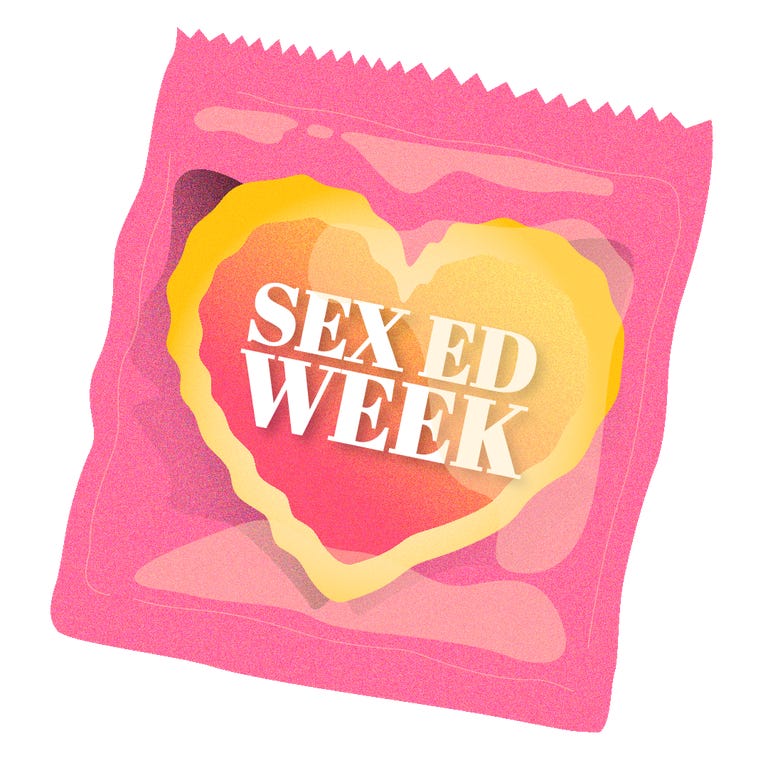
Lifetime's She's Too Young Was a Sex Ed Cult Classic That Deserves More Respect
She's Too Young was a surprisingly progressive look at a high school syphilis epidemic, and I owe my health teacher an apology

In my 2007 high school health class, the sex education unit was treated as a joke simply because everyone was too deeply uncomfortable to abstain from laughing. This was the year some noble Planned Parenthood volunteer came to New Jersey's Ocean Township High School to stick a magnetic dildo on the whiteboard and demonstrate the proper way to put on a condom. (For the record, it was objectively funny to watch, but our fears of unplanned pregnancy and genital warts made us laugh even harder than the comic display deserved.)
So when the teacher rolled in the VCR and queued up the 2004 Lifetime movie She's Too Young, we all settled in for what we had heard in the hallways was the pinnacle of sex ed laughability. "Some girl randomly yells, 'I have syphilis!' in the middle of the movie," I remember a friend in study hall warning me before I headed to the 6th period screening. The fact that She's Too Young was a TV movie made for the Lifetime network only added to its ludicrousness; the channel's reputation for melodrama was encapsulated in other titles from the era like Baby for Sale and Too Young to Be a Dad.
Watching the seemingly exaggerated She's Too Young -- in which partying, casual hookups, and sexually transmitted infections ran rampant -- became a rite of passage for students at my high school, an inside joke we could all laugh at toward the end of junior year. So when the idea of TV Guide's Sex Ed Week came around, I thought it'd be hilarious to revisit the movie over a decade later. What I didn't expect was to gain newfound respect for the film, for the actors, and for the educators who showed it in health class.

Miriam McDonald, She's Too Young
LifetimeTurns out, She's Too Young was not a boardroom fantasy turned into a film purely for shock value. It was closely based on PBS's investigative Frontline documentary special, The Lost Children of Rockland County, which followed a 1996 syphilis breakout in a small, affluent Georgia town. The documentary (available to stream here) is shockingly candid: teenagers casually discuss topics like group sex and the STI epidemic with a blunt and oftentimes disturbingly unaffected demeanor, painting a world in which this behavior is not only accepted but normalized. In comparison, Lifetime's adaptation explores these themes with far more nuance and relatability. In truth, She's Too Young is not an overblown saga -- it's an understated cautionary tale.
"It was shocking," She's Too Young star Mike Erwin said of viewing the PBS documentary. "I think my mouth was open the whole time I was watching it, going, 'I can't believe this really happened.' I think Lifetime even took it down a peg or two to make it more palpable for everyone to comprehend."
Let's Talk About TV's Evolving, Complicated Relationship With Sex
In She's Too Young, Erwin plays Nick Hartman, the stereotypical bad boy upperclassman who preys on younger students with his good looks and coveted driver's license. Nick is later found to be the main spreader of syphilis among the students, pressuring multiple girls into unprotected sex, including vulnerable 14-year-old Dawn (Miriam McDonald). Erwin, who was in his mid-20s during filming, seemed more rattled by the source material than his younger co-star, McDonald, who was still in high school at the time.
"I was pretty close to my character's age," the actress told TV Guide. "I was going through these same kinds of things in high school. ... I was kind of late to the game, but I could relate to the pressures. I was a little stunned at the content [of the documentary] because it's so hard to believe that something so dramatic would be happening with such young kids, but at the same time I knew it was true."
Despite the shocking true story, the Lifetime film didn't take an alarmist approach to the epidemic; the students are never shamed for having sex, even when the young Dawn reveals she's already had 15 sexual partners. The film simply warns of the risks of unprotected sex and succumbing to peer pressure, always emphasizing the infection's treatability over its stigma.
This isn't to say that She's Too Young doesn't have Lifetime's signature melodramatic flair, and unfortunately, the film's campiness has far overshadowed its surprisingly progressive message. One of the most memorable parts in the movie, and one that quickly became a favorite quote among my classmates, is a scene in which a school nurse administers shots to students affected by the widespread syphilis outbreak. Bad boy Nick shamelessly sneers at the nurse, "If you want my advice, you'd better stick them all because I probably did."
Erwin said he still gets remembered for that brazen innuendo: "There's a theater that shows Lifetime movies and apparently that's a line that everyone quotes," he said. "And it's funny because I don't even remember that line being a catchphrase. But you know what? Hey, at least I got a catchphrase!"

In the film, Nick, who is toxic masculinity in human form, is offset by Tommy, a smart, respectful teen played by Joe Dinicol. One of the few characters who doesn't get syphilis, Joe never judges his friend Hannah (Alexis Dziena) after she contracts the infection from Nick, and the two even wind up sparking up a romance after he becomes a source of support and understanding for her during this challenging time.
Dinicol said he thinks the progressive message of the film -- that STIs can be prevented, treated, and not get in the way of future romantic or sexual relationships -- is a good one, even if the road to that lesson is tragic. "People being open about sex and sexuality is definitely a positive. But what a sad way into it -- what a sad way to be forced into being open about sexuality, getting syphilis," he said.
But McDonald, who was also a fixture on the teen drama Degrassi: The Next Generation, admitted that dealing with controversial topics like STIs on-screen did create some difficulties for her off the set. "Me walking into high school was not easy sometimes because right around this time I was filming this movie where my character gets syphilis, I was filmingDegrassiand my character got gonorrhea," she recalled. "I cannot lie, there were times when being a teenager and dealing with this stuff so publicly makes you a bit of a target."
Overall, though, McDonald said she's proud to have tackled taboo topics for the sake of awareness and helping other teens. "I get sweet, sincere messages from people that have watched this stuff saying how it helped them get through something, so that makes it all so worth it," she said.
TV Still Struggles with Body-Positive Sex, But Shrill Is a Big Step Forward
Erwin, too, is happy that She's Too Young still holds some educational value. "In high school, the sex talk starts coming around -- who's had sex, who hasn't ... those ideas start to swirl around and I don't think most people and parents really feel comfortable opening up that discussion," he said. "The film wanted to create an avenue for discussion between parents and kids, and I hope that's what it did."
In retrospect, She's Too Young didn't deserve all the ridicule it got from me and my classmates, and it was much easier to laugh at before I was aware that this syphilis epidemic actually happened. Re-watching the film today made me realize its progressiveness. She's Too Young shows viewers syphilis isn't an STI only one type of student contracts -- in the end, everyone from the "bad boys" to the "good girls" is susceptible. But perhaps most importantly, the movie showed viewers that many STIs like this can be treatable if they're caught early enough.
Unlike ineffective, abstinence-only sex education, my health class provided us with information that we were too scared to ask our parents about, and equipped us with the knowledge we needed to make informed decisions in our own sex lives. For that, I'm thankful, and a little ashamed at the spectacle we made about a little TV movie that was just trying to help us grow. (But hey, that "stick them all" line is still pretty funny.)
This week, TV Guide is exploring television's relationship with sex, puberty, and everything in between. As part of Sex Ed Week, we're examining how Shrill provides a much-needed, body-positive representation of sex, how TV continues to fail viewers when it comes to adult virginity,the many life lessons we learned from Degrassi, and more. You can check out all our Sex Ed Week content here.
